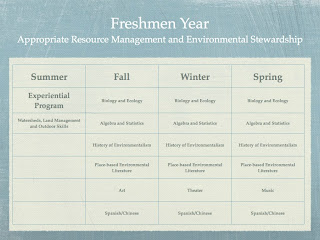













Zoe Weil, cofounder and president of the Institute for Humane Education, said in a recent TED Talk: “We need a bigger vision for the purpose of schooling... It should be this: that we provide every student with the knowledge, the tools, and the motivation to be conscientious choice makers and engaged change makers for a restored and healthy and humane world for all.” This is exactly what SEED will deliver its students. The thematic and interdisciplinary academic curriculum combined with the Experiential Program will produce graduates who are true “solutionaries.”
SEED academy will focus on issues of land use, the environment, social equity and global development. The emphasis will not merely be on debating ideas for an academic exercise. Rather, right from the start, students will be asked to decide on solutions for improvement. Most importantly, the students will need to engage in and implement these solutions. Weil professes: “We need to graduate a generation of solutionaries.” SEED will deliver just that.
As an anecdote, Weil describes a student who did a research assignment and after his presentation, he wanted to hand out leaflets. To Weil’s surprise, the student intended to hand the leaflets out onto the Philadelphia streets, not just in the classroom. Weil says: “He’d become an activist over night.” This is precisely what needs to happen. All projects should be public. Students must utilize social media such as Facebook, Twitter, and YouTube so that their ideas far exceed the walls of the school.
We have shared the idea of SEED to many educators and friends. We believe that the more we talk about it and the more feedback we get the better. Of the concerns people raise about the curriculum, the most common concern is whether graduates will be prepared. I absolutely loved the way in which Weil answered this same question:
“What would our graduates go on to do? Well they would do the same thing that graduates do today. They’d be business people and health care providers and plumbers and engineers... and beauticians... The difference would be they would perceive themselves as solutionaries. They would know that it was their responsibility to ensure that the systems within their profession were just and humane and peaceful. Why? Because that is what they would have learned in school.”
I’d like to thank Zoe Weil for an excellent talk (see talk) and further inspiring me to re-think how we educate.
The EXPERIENTIAL PROGRAM at SEED academy teaches students lifelong skills, rarely taught in independent secondary schools. When teaching math, students often ask: "When will I ever use this?" While the answer I give- that students in high school are trained to think clearly and analytically- the truth is that I often wonder why more applicable skills are not taught.
Then I think: What are some things that an 18 year old should definitely know how to do? Speak another language. Change a tire. Start a good fire and be able to cook over it. Fix a leaky pipe and do basic home repair. Be alone, happily. Be honest with oneself. Grow food. Help others.
Freshmen Year: Students spend 10 weeks in the White Mountains, exploring watersheds and learning to BE in the woods. By the end, students will spend one week ALONE. With only a tarp, a lighter, access to a creek and some simple food, these students will live quietly by themselves for 7 days, developing a deep connection with nature and a deeper sense of self. They will come away from the program with an ability to be alone, with a love of (or at least an appreciation for) wilderness, and a resounding feeling of independence.
Sophomore Year: Students spend 10 weeks building simple homes in underprivileged communities. With a hammer as their tool, each student will learn about home maintenance and repair. More importantly, this altruistic endeavor will push students to think about what it means to give. Evening workshops will challenge students to consider their own privileges. The end goal is for students to become aware of disparities in opportunity and become committed to social equity.
Junior Year: Students spread their wings and spend seven weeks in a home-stay in either China or a Spanish speaking country. Students will learn to cross cultural bridges, challenge their view of the world, and come away fluent in their language of study. Then, students will finish the trip with three weeks on an organic farm. Learning about food production, students will have the chance to get their hands dirty while continuing to hone their language skills.
Senior Year: Students depart to the East, spending eleven weeks in the north of Thailand. Three weeks will be spent in a Buddhist monastary- living simply, practicing meditation. Three weeks will be spent at a UN refugee camp, helping indigenous groups who have crossed the Burmese border in refuge. Three more weeks will be spent teaching english in underserved schools. In the last two weeks, seniors will spend time processing their trip and their high school experience, as well as planning for their CAPSTONE PROJECT, where they will study, research, and then communicate on a topic
Graduating seniors will have spent 10 weeks in the wilderness, 10 weeks building homes, and 21 weeks out of the country. They will have lived in Buddhist temples and volunteered in UN refugee camps. They will have learned to build a fire and cook over it, and they will have grown their own food.
These graduating seniors are global citizens. They are worldly and self-sufficient. Their perspective is enormous, but not as large as their hearts.